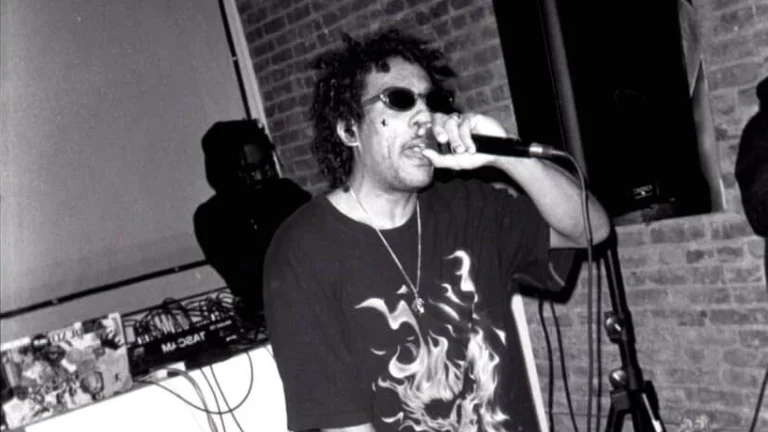We’ve all wandered, fallen off course at some point in life, buried underneath the tides of emotions and the unknown. Still, it’s hard to explain the feeling outside firsthand experience. Lost Satellite, a collaborative project between the producer whose sound is rooted in hip-hop, PERZona, blues-inspired Boston’s Austin Wilson, and alternative pop-style duo Phelt, attempts explanation, probing the unsteady nature of existence. The album comprises nine deep tracks, mixing slow tempos, bluesy rhythms, and jazz improvisation for a profoundly exclusive and brooding atmosphere that intensifys the album’s core.
The lightest moment on Lost Satellite comes with, “intro/we all love fruit,” a track easing the listener into its heavier themes. Serene instrumental paints an imagery of sunrise, chirping birds, and the gentle flow of water after a rainy night. As the song continues, the energy changes into an upbeat, scattered rhythm with intricate percussion and smooth vocals, giving the track a more freeform texture. Here PERZona maintains the beat long enough that the listener is almost bored of the monotony. But, alas, spoken words emerge: “From I have an idea to I need to create / Starting with staring at blank canvases of opportunity to dipping brushes in paint…” Phelt says, his voice carrying the commanding cadence of a Malcolm X speech. It’s a poetic feel, exciting listeners with anticipation for the rest of the album, which he calls an “amalgamation of miscellaneous observations through rhythmic repertoires,” acknowledging the project may not resonate with everyone—just as some prefer apples over oranges—yet asserting, “We all love fruit.”
And it turns out the metaphor—and the artist—is right. Lost Satellite isn’t for everyone rather for those questioning or on a path to reinventing their fate and quest in life. With “When I Figure Out,” featuring Brooklyn-based “rhythmic poet” Authentic Intelligence, they establish the central motif of the project: the feeling of being lost and searching for clarity. Building off stacked vocal harmony, a downtempo beat laced with a bluesy rhythm sets the stage for an inner odyssey, as the artist explores alienation and being unmoored from collective consciousness. “Half the time I don’t even understand these words that I say,” he raps over the beat with an almost indifferent delivery, “…I make tussle with bouts of not feeling worthy of love.” This line abridges the album’s primary tension—an artist adrift in his thoughts and grappling with self-worth. His detached manner only heightens the feeling of disconnection, making the confession hit harder.
Lost Satellite leans further into defeatism with the warm Spanish interludes, “Entonces” and “todo lo que ya se fue, containing soulful undertones. These songs don’t offer much else to the non-spanish-speaking community except a balanced groove masking the poignancy of the tracks. “Entonces,” for one, is driven by a neo-soul layered percussion. The title meaning “then” or “so,” (or used simply as a space holder) suggests a contemplation of what comes next, fitting the album’s overarching theme of disorientation. Meanwhile, “Todo lo que ya se fue” (meaning “everything that is already gone”) leans into loss and resignation with a shoegaze-like haze of reverb-heavy instrumentals.
The title track, “Lost Satellite,” then follows the flow of cynicism through its bebop-inspired jazz and instrumental virtuosity. Ann Arbor, Michigan’s Tessa Jade sings, “Losing my focus / I’ve been up floating away / Shouldn’t be alone out here…,” before the words “Satellite, lost” become a form of entrancing mantra. She harmonizes over the beat, her tone delicate, weightless. Loose, sparse instrumentation creates the feeling of being untethered, detached from solid ground—which is perhaps the feeling the artists were hoping to inspire; the one that inspired the record. Combining structured melodies with free-form jazz improvisation, the song shifts between moments of order, creating another metaphor for a dismal life.
And the project doesn’t get any less sombre. It follows a kind of linear progression; the deeper into the album, the deeper the melancholy. The ingenous closer “REASONS,” a purely instrumental track, summarizes the whole journey of Lost Satellite without a single lyric. This rich, slightly experimental piece combines electronic textures, rap-style rhythms, and jazz influences, like offbeat piano chords and saxophone-like synth melodies, into a smooth blend. A deep bassline frames the track while electronic instruments swirl around in an intricate dance, creating a sense of cessation and endless motion. Soft but ever-present kicks and perfectly timed rims/snares drive the beat while wind instruments and keys float above, adding layers of complexity. Later in the song, the sound shifts towards a more aggressive rock-infused climax before dissolving into silence, mirroring the emotional steep of the album itself. In a way, it is saying: sometimes, there is chaos and nothing else; no denouement, no explanation, no resolution, just chaos.
The only thing close to closure comes with Authentic Intelligence’s verse on “When I Figure Out,” a slow, deliberate rap, with lyrics reflecting on the power of music to anchor oneself to real life. “I think these instrumentals are a way to the soul, it’s what I use to solidify my hold on reality,” he says, while he also admits, “I often feel like a man lost in the maze of his plans.” This moment encapsulates the heart of Lost Satellite, and much of the human experience, really—an ongoing struggle between feeling adrift and striving for meaning.
Forcing you to reflect through fatalist lyricism and somber beats, Lost Satellite is largely introspective, aided by an undeniable emotional vulnerability over adventurous sonic experimentation. Masterfully combining genres, languages, and storytelling techniques, the dynamic ensemble compiles a project that feels personal yet boundless. Its willing tendency to lean into ambiguity, both lyrically and instrumentally, sets it apart, refusing or simply lacking easy answers, and instead offering an experience mirroring the unpredictability of existence. The album is an identity for those caught in the in-between, and wonder if they’ll ever find their way.





